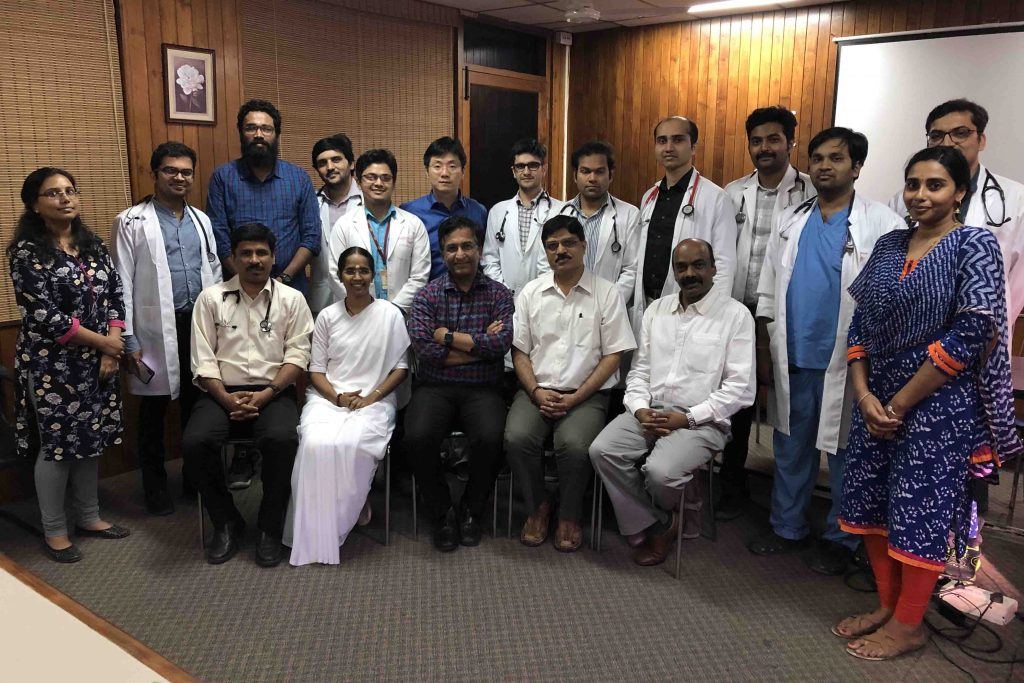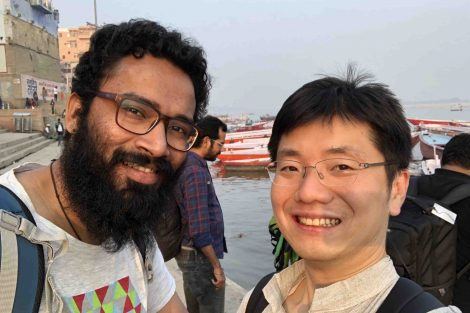At a hospital in India, MPH ’19 students Sung Hwi Hong and Sriram Venkitaraman worked side-by-side with doctors to develop a system for measuring quality of care
May 15, 2019 – Before heading to Kerala, India, to help a hospital measure quality of care for its patients, Sriram Venkitaraman and Sung Hwi Hong were somewhat worried. After all, they were at the beginning of their medical careers, and they thought that the hospital staff they’d be working with—many with years of experience—might resent their presence.
As it turned out, the pair tossed aside their worries shortly after their arrival. After initial skepticism, not only did the various stakeholders at the hospital, including doctors, nurses, and staff, welcome the opportunity to discuss needed quality improvements, they agreed to come up with their own metrics for measuring those improvements. Hong and Venkitaraman said that they were able to have open and honest communication with hospital staff, which made it possible for them to develop quality analysis tools that were agreed on by everyone.
Two-way street
Venkitaraman and Hong—both medical doctors, and both MPH-45 students in global health graduating in May 2019—spent three weeks last January on the quality improvement project at Amrita Institute of Medical Sciences (AIMS), a tertiary care hospital in Kerala. For Venkitaraman, who is from Kerala, it was a homecoming of sorts; Hong had been to India but never to Kerala. Both students were intrigued with the idea of getting a close-up view of how clinicians in a developing country address health care quality.
The students’ work in Kerala, which fulfilled the field practice requirement for the MPH degree, was supported by a Rose Service Learning Fellowship. Funded by a gift from Deborah Rose, SM ’75, the Rose Fellowships support students and postdoctoral fellows at Harvard Chan School to engage in service learning projects in the U.S. or abroad. The goal of these projects is to address community-identified needs, working in partnership with partner communities or organizations. Venkitaraman was also a recipient of the Carson Family Fellowship.
Hong and Venkitaraman got the opportunity to do their practicum at AIMS as part of an ongoing Harvard Global Health Institute study on quality of care in hospitals in India. They learned about the Rose Fellowship from a student newsletter. Realizing that the fellowship’s requirements fit their India project, they applied for and received funding.
At the hospital, the students developed a list of 113 indicators to help staff monitor the quality of care across four diseases—COPD (chronic obstructive pulmonary disease), pneumonia, stroke, and heart failure. The indicators covered four categories of care for each disease: initial evaluation, further assessment, treatment, and assessment at time of discharge. The students also recommended that hospital staff use checklists to ensure a standardized process of care.
Venkitaraman and Hong said that the key to their project’s success was that they created their list of quality metrics only after asking questions and seeking input from people who worked at the hospital. “All of these indicators were suggested by them, not by us,” said Venkitaraman. Added Hong, “We told local clinicians that they were the experts and that we were there to also learn from them.”
Context matters
Understanding the context that the AIMS doctors were working in was crucial to developing the right metrics, the students said. So although the indicators they developed were based on standard, globally accepted guidelines, they also took into account realities at AIMS and in the Kerala region as a whole.
For example, it’s commonly understood that the standard treatment for a stroke patient—a procedure called thrombolysis, which removes the blood clot that causes stroke—should occur within 4.5 hours of when symptoms begin. But constraints in the Indian health system can prevent treatment within this window, said Venkitaraman. For one thing, patients can have logistical issues getting to hospitals quickly. In addition, India lacks a structured referral system that would facilitate patients going directly to a tertiary care center like AIMS for specialized treatment.
Hong and Venkitaraman, consulting with the AIMS doctors, incorporated these constraints into their metrics for measuring the quality of stroke treatment at the hospital. They decided to make the starting point for measuring time-to-treatment not from when the patient started having symptoms—which often isn’t clear—but from when the patient reports to the hospital. Altering this metric “is not to say that the hospital is treating patients badly,” Venkitaraman said. “That is the best possible care they can give in the given setting. It’s all about the context.”
Venkitaraman and Hong reviewed more than 100 patient case files at the hospital so that doctors could see how they were performing in terms of the metrics for all four diseases that were examined. The doctors were okay with the fact that, sometimes, the students’ review uncovered poor quality care. They told Hong and Venkitaraman that, in the future, they would begin evaluating their care differently, using the new metrics as a guide.

Paying it forward
Before they left Kerala, Hong and Venkitaraman helped two hospital staff members learn the process for developing and analyzing metrics so that the hospital can continue focusing on quality, while also incorporating more diseases over time. The students hope that, eventually, the type of system they developed can be used at hospitals throughout Kerala and in other parts of India.
After graduation, Hong will work with Doctors Without Borders after finishing his residency program. Venkitaraman will return to work as a doctor and civil servant in Kerala. Venkitaraman said that the experience at AIMS taught him that implementing change at the institutional level is much easier than doing it system-wide. Added Hong, “I learned that frequent and open-hearted communication between different stakeholders can result in a great outcome.”
photos courtesy Sung Hwi Hong and Sriram Venkitaraman
